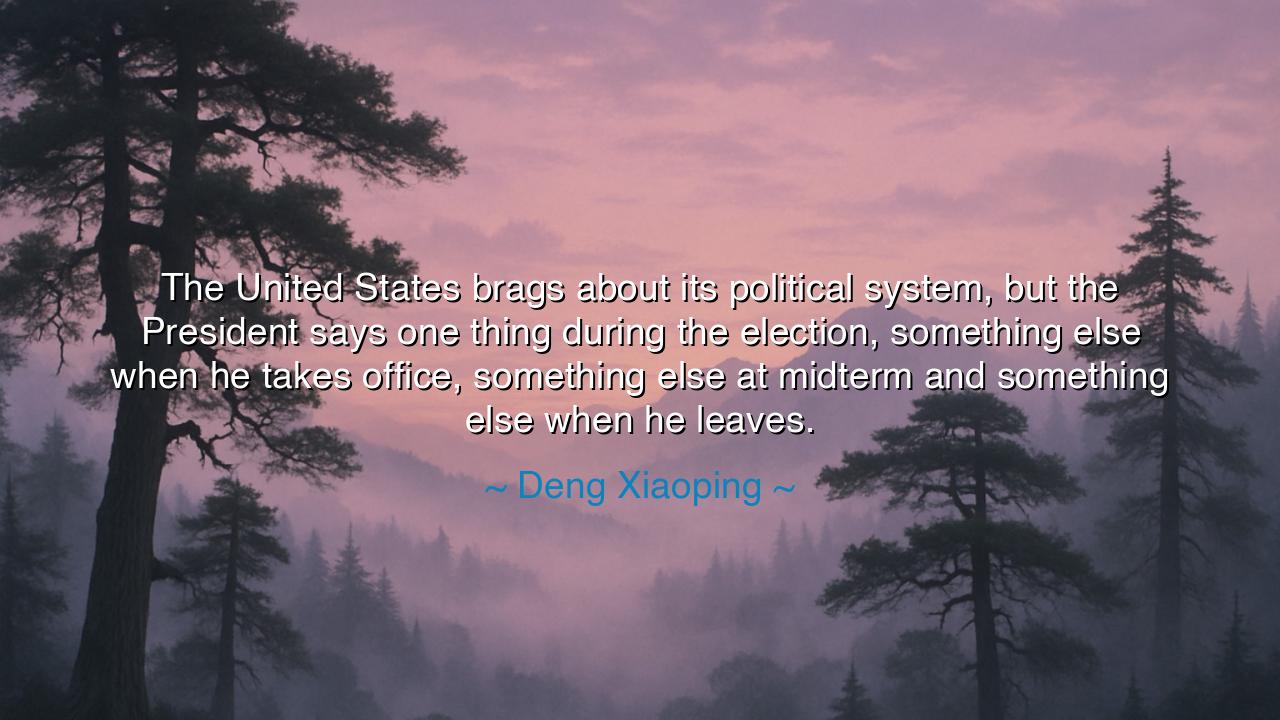
The United States brags about its political system, but the
The United States brags about its political system, but the President says one thing during the election, something else when he takes office, something else at midterm and something else when he leaves.






The words of Deng Xiaoping, “The United States brags about its political system, but the President says one thing during the election, something else when he takes office, something else at midterm and something else when he leaves,” ring with the sharpness of both observation and critique. In them is the recognition that democracy, though adorned in noble rhetoric, is often clouded by inconsistency. Leaders shift their words as winds shift direction, not always from deceit, but from the endless tide of ambition, compromise, and circumstance.
The ancients knew this truth well. Promises made in the market or the forum were often broken in the senate or the palace. Power bends men, and the throne makes demands unknown to the campaigner’s tongue. Thus, Deng’s words echo an eternal pattern: the speech of a candidate is poetry, the speech of a ruler is prose, and the speech of one departing office is often a lament. What begins as certainty too often ends as contradiction.
Consider the story of Woodrow Wilson, who campaigned on the promise to keep America out of the Great War. Yet once in office, faced with pressures of history and alliances, he led the nation into the conflict he had vowed to avoid. His words at election, at inauguration, and at midterm were not the same. The people, who had believed one voice, were met with another. Here we see the truth of Deng’s critique: that the shifting nature of politics makes continuity between promise and deed fragile.
Yet, this truth is not unique to America. In every nation, the burden of rule transforms intention. A king may swear justice but yield to necessity; a president may vow peace but turn to war. Deng, himself a master of political survival, understood that systems built on elections can produce leaders who change their face as the seasons turn. What he exposed was the gap between the boasting of ideals and the reality of practice.
So let this wisdom endure: in politics, words are like banners carried in the wind—bright at first, but ever changing with the storm. The people must therefore look not only to what is spoken, but to what is done. For the truest measure of a political system is not the promises that echo at its birth, but the deeds that remain at its end. And those who would trust only in words must learn that the tongue of power is seldom the same as the tongue of ambition.






L913.Phuong linh 9a2
Deng Xiaoping’s quote highlights a cynicism that many people feel about the political process, particularly in democracies. If leaders can say one thing to get elected and another to govern, what does that say about the integrity of political systems? Should we be more focused on a leader’s actions rather than their promises, or can political promises still be a genuine source of hope and change?
NBLe Ho Ngoc Bang
Deng Xiaoping’s perspective on American politics points to a common frustration with political leaders who seem to say anything to win elections but fail to deliver once in office. But is this a uniquely American issue, or is this a problem with politics everywhere? How can voters truly know what a candidate will do once elected if their words change so often?
TMLe Tuan Minh
This quote from Deng Xiaoping could be interpreted as a sharp critique of the political system in the United States, highlighting the gap between rhetoric and action. Why do politicians seem to change their positions so frequently? Is it simply the nature of politics, or does this inconsistency undermine the public’s trust in the system? Does this mean that political promises should be viewed with skepticism from the start?
PTPham Tuan
Deng Xiaoping's quote seems to reflect the disillusionment many people feel with political promises. It raises a significant point about the inconsistency between what leaders say during campaigns and what they do once in office. Is this a flaw inherent in the political system, where promises are made to secure votes but later abandoned due to pressure or political realities? Or does it reveal a deeper issue with trust in leadership?